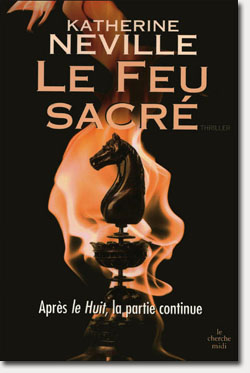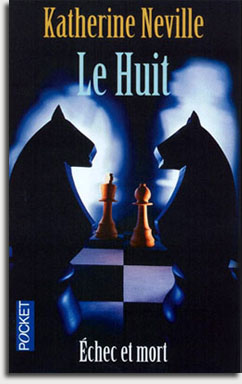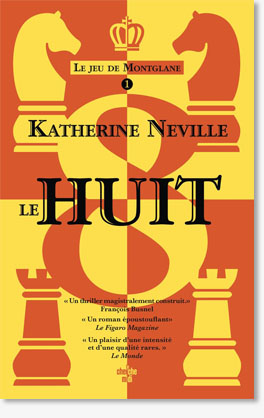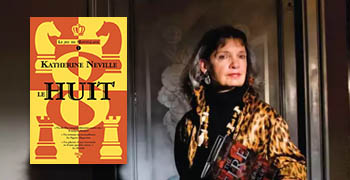 Lire l'interview en français
Lire l'interview en français
Hello Katherine, our first question is a small ritual on Plume Libre. Could you tell us who are you, Katherine Neville ? 
Any novelist will tell you that writing literature is a very schizophrenic profession.
Half the time you are locked in a box, sitting in an unnatural position for endless hours, with before you a pad of paper or some machine, as you watch scenes of exotic places float before your eyes, as you listen to voices in your head, as you scribble or type as quickly as possible to set them down before they vaporize.
Then, when it's all done, (sometimes, even before the voices have fully passed into the ether) you put on your author clothes and set out upon a series of airplane trips, lectures, literary luncheons, interviews and book signings that would daunt even Barack Obama. While in the back of your mind, you can't help recall what you felt like when you wrote your first book (usually, for us novelists, by age eight) and as you wistfully retrieve whatever your own literary equivalent may be of the Proustian scent of Chamomile tea and Madeleines.
So this is the life we all have, regardless of what kind of fiction we write. We are only fully alive and fulfilling our true profession and our potential when we are sitting in a small space with no external activities involving children, spouses, opera tickets, or pets. We are only able to support this "true potential" in the real world, once we get off our posteriors and engage with the real world: The mind-brain problem.
However I must confess that I love all this complexity, diversity--and most of all: Paradox. The schizophrenic life of a writer-author was designed perfectly for me. The most astonishing thing that I've learned about being a writer of fiction is something I never would have guessed until my first book was published. Now I've had it demonstrated, time and again, over the past twenty years that my books have been in print. Just this: I don't have to figure out who I am, through hours of endless self-analysis or therapy. My readers already know who I am. They don't think they know me; they know how I think. It's kind of a love affair consummated through literature.
Reading your bio gives the impression that you live several lives in one : model, photographer, finance & energy executive consultant, writer, etc... How do you manage it ? 
I always worked to support myself, even though school. But when I first got out of school, many decades ago, there were no professional jobs for women unless you could use a typewriter! Luckily there was a new industry that was just beginning to become huge: data processing. Companies were prepared to train us to work with computers and to pay us just as much as the men. And since I was willing to accept a job anywhere, and my average job only lasted a few years, I got to live in and experience many different cultures--even right here inside the US. My career in computers finally took me all over the United States and all over the world. I
n between jobs--whenever I got fired or laid off from work--I was also willing do any job I could get until I found a new position--waiter or busboy in a restaurant. Also--whenever I got to a new city, I immediately took my fashion photos with me and signed up with the local modeling agency. That way, I would meet many new people, and I knew that, even if I got no part-time work as a model, all the models got invited to many dinner parties, so I could always eat! And the photographers I worked with were happy to train me--so that eventually I was able to become a commercial photographer myself.
How did you come to writing ? 
I'm afraid I don't know the answer to that one. For as long as I can remember, I've been writing--and I was listening to stories and telling other people stories, even before I could read or write. I wrote my first book when I was eight years old, and I've studied literature at three universities. All the way through grad school and during the entire 20 years I was working, I was writing every day. But it took a very long time before I found the structure that I needed to write the kind of stories I knew I wanted to tell. It took until age forty before I got it all together and my first book was published!
 « The fire » will be published by the beginning of April in France, could you present us your new book ?
« The fire » will be published by the beginning of April in France, could you present us your new book ? 
THE FIRE is the sequel to THE EIGHT, which was published twenty years ago.
THE EIGHT tells the story of a fabulous gold-and-silver bejeweled chess set that once belonged to Charlemagne. It was buried for 1000 years, and is dug up during the French Revolution and scattered all over the world, because it contains a secret of dangerous power. The tale goes from the 1790s to the 1970s (during the OPEC oil embargo in North Africa)--with everybody on a 200-year-long chase to find the chess pieces and reassemble them. At the conclusion of THE EIGHT, we believe we know what has become of all the chess pieces and who has "won the Game." Cat Velis and her friends, Lily, Nim and Solarin, are burying the pieces and the world seems safe.
But in the opening of THE FIRE, set thirty years later, we learn that one of the most important chess pieces--the Black Queen--has surfaced and that Alexandra--daughter of Cat and Solarin from the previous book--must discover what the Game is really all about. She discovers that what she has believed about her own life--and what we believed that we knew at the end of the last book--may be different when viewed from another point of view. (see below)
How and why did you decide to write the sequel of « The eight » more than 20 years later ? 
By 1992, only 4 years after THE EIGHT, I knew exactly how to do the sequel. I knew who the characters were and what was the plot. But whenever I sat down to write it, events in real life kept interfering. Among other things, we moved houses three or four times, we lived in two other countries--the Berlin Wall came down while we lived in Germany--all kinds of amazing events took place, and I published A CALCULATED RISK and THE MAGIC CIRCLE in the middle of all this.
Then when I was really rolling along once again with THE FIRE--I was more than 1/3 finished with the story--a plane suddenly hit the Pentagon right across the Potomac River from my apartment in Washington DC. I knew at that moment that I wasn't writing the book I thought I was supposed to be writing. Because you can't write the sequel to a book about OPEC and Arabs and Islam and the Middle East when it is happening again, just as before, all around you. And it turned out to be true. It turned out that what my book really wanted to be about was not the Game; it was the chess set. (A chess set invented by me.) As we had learned toward the very end of THE EIGHT, the chess set that once belonged to Charlemagne, around which the plot turns, was "created" in 775 AD in what was the then-brand-new city of Baghdad.
So I realized that my book could not have been written when I first conceived it, in 1992--nor even ten years later, in 2002. Because the events that were supposed to be in the book had not yet happened: we had not yet entered Baghdad, the exact spot where the chess set first came to light and set the Game on its adamantine course.
 What are the main differences between « The eight » and « The fire » ?
What are the main differences between « The eight » and « The fire » ?
When I first conceived THE FIRE, I saw that the only way to do the sequel was to have the children of the previous characters know nothing of the events in the previous story. Other characters who were also present in those earlier scenes would arrive and tell the story of what happened--but from a different point of view.
So it's like walking into the same room where you were before--you can still recall where all the furniture was placed and where people were sitting--but now you are seeing it by coming in a different door, providing pieces that were missing, giving us all a 90-degree perspective shift to the right.
So we now have Nim sitting on Key Bridge above the Potomac River at midnight, describing things about his childhood and life to his niece, Alexandra, that he might never have told her mother in the light of day. And we have Lily Rad, who was in the Sahara with Cat, and who met Solarin--Cat's future husband and the father of her child-- at the same chess club--but now telling the same stories, describing these same scenes, from her own unique point of view as a chess champion.
But the biggest difference is that--by shifting our perspective of the action in the previous book--this also changes our perception of the meaning of the Game--and of the very chessboard itself.
When reading your books, we notice that you might have done a lot of searchs and collect a lot of documentation to write them. How is born the idea of this worlwide chess game mixing real people and imagined characters ? 
Life is research. I never stop being curious about how things work and how they interconnect. But the one thing that was a stumbling block for me in writing an entire novel, was that I knew I needed a different structure to tell the kind of story that I wanted to read myself.
Scheherezade deployed the Persian "tale-within-a-tale" interwoven technique, which I have used from the beginning (so did Chaucer, Boccaccio, and Ovid.) And I also used the "shifted point of view" by telling the historic-modern parts from two pov's: the "Rashomon" technique that's so common in Oriental storytelling. But there was something still missing, that was necessary to pull this all together so it wasn't all just a rambling, shambling meander.
Then, while I was working in North Africa on a project in the 1970s, the OPEC embargo took place. After 30 years of the Cold War, this reminded me of a giant chess game of two opposing forces, but where someone (the "Third World") had suddenly thrown in an unexpected move. And--maybe because it was just then the 10th anniversary of the Algerian Revolution against France--it also reminded me of the French Revolution, which had done so much to alter the structure of Europe in the same fashion.
I knew that chess itself would provide the literary structure for my book, because it enabled us to see large strategies and close-in tactics--many major and minor characters all playing key roles as pawns or pieces--and all arrayed against the panoramic background of the ongoing Game itself.
 Do you think that, in a certain way, with « The eight » you open the door to a kind of « esotoric » novels (the search of the truth through the years) as we can now find a lot in bookshops ?
Do you think that, in a certain way, with « The eight » you open the door to a kind of « esotoric » novels (the search of the truth through the years) as we can now find a lot in bookshops ? 
It's true that a number of notable literary and fiction journals have been giving me credit for having "paved the way" for this suddenly popular genre of books like the Da Vinci Code.
But when THE EIGHT was first published 20 years ago, people didn't really know how to describe it: it was reviewed as science fiction, romance, historical, modern, mystery, techno-thriller... I was called "the female" Umberto Eco, Charles Dickens, Alexandre Dumas, Stephen Spielberg--The Washington Post called THE EIGHT the "Feminist Raiders of the Lost Ark"!
But I myself have never beeen confused about what I am writing: it's the oldest form of literature that we know of: the Quest.
We have Jason questing after the Golden Fleece, Parsifal seeking the Holy Grail--even Odysseus and Dorothy of Oz, each searching for that elusive thing called "Home." And the oldest recorded story that we know of: King Gilgamesh of Sumer, who was seeking the elixir of Life. That's the genre that I have always been writing and that I hope I will always continue to write.
However--there is a large difference that I must point out, between my books and the other books you referred to: In my books, the females get to go on the quest and have all the adventures, solve all the puzzles, rescue the heroes, and wind up with the elixir (and the cute guys). Just like real life!
What are your favorite authors, books ? 
I read books compulsively and indiscriminately, in every genre--I have 6000 or 7000 books in my house.
My favorite authors are the ones whose books I want to go back and read again and again (that's why it makes me happy when people say this about my books.) These include so many: the classics for me are thing like Raphael Sabatini's pirate stories, Rider Haggard, Voltaire, Alexandre Dumas, and especially Goethe--but I also read everybody from Borges to Byron to Chinua Achebe to Orhan Pamuk.
One of my favorites these past few years is a woman who also helped to resurface the Quest novel and who almost single-handedly got tens of millions of very young children to read 700-page books: J.K. Rowling.
Thank you very much Katherine, you have the last word. 
The quest continues.
Lire l'interview en français
Any novelist will tell you that writing literature is a very schizophrenic profession.
I always worked to support myself, even though school. But when I first got out of school, many decades ago, there were no professional jobs for women unless you could use a typewriter! Luckily there was a new industry that was just beginning to become huge: data processing. Companies were prepared to train us to work with computers and to pay us just as much as the men. And since I was willing to accept a job anywhere, and my average job only lasted a few years, I got to live in and experience many different cultures--even right here inside the US. My career in computers finally took me all over the United States and all over the world. I
I'm afraid I don't know the answer to that one. For as long as I can remember, I've been writing--and I was listening to stories and telling other people stories, even before I could read or write. I wrote my first book when I was eight years old, and I've studied literature at three universities. All the way through grad school and during the entire 20 years I was working, I was writing every day. But it took a very long time before I found the structure that I needed to write the kind of stories I knew I wanted to tell. It took until age forty before I got it all together and my first book was published!
« The fire » will be published by the beginning of April in France, could you present us your new book ?
THE FIRE is the sequel to THE EIGHT, which was published twenty years ago.
By 1992, only 4 years after THE EIGHT, I knew exactly how to do the sequel. I knew who the characters were and what was the plot. But whenever I sat down to write it, events in real life kept interfering. Among other things, we moved houses three or four times, we lived in two other countries--the Berlin Wall came down while we lived in Germany--all kinds of amazing events took place, and I published A CALCULATED RISK and THE MAGIC CIRCLE in the middle of all this.
What are the main differences between « The eight » and « The fire » ?
When I first conceived THE FIRE, I saw that the only way to do the sequel was to have the children of the previous characters know nothing of the events in the previous story. Other characters who were also present in those earlier scenes would arrive and tell the story of what happened--but from a different point of view.
Life is research. I never stop being curious about how things work and how they interconnect. But the one thing that was a stumbling block for me in writing an entire novel, was that I knew I needed a different structure to tell the kind of story that I wanted to read myself.
Do you think that, in a certain way, with « The eight » you open the door to a kind of « esotoric » novels (the search of the truth through the years) as we can now find a lot in bookshops ?
It's true that a number of notable literary and fiction journals have been giving me credit for having "paved the way" for this suddenly popular genre of books like the Da Vinci Code.
I read books compulsively and indiscriminately, in every genre--I have 6000 or 7000 books in my house.
The quest continues.


